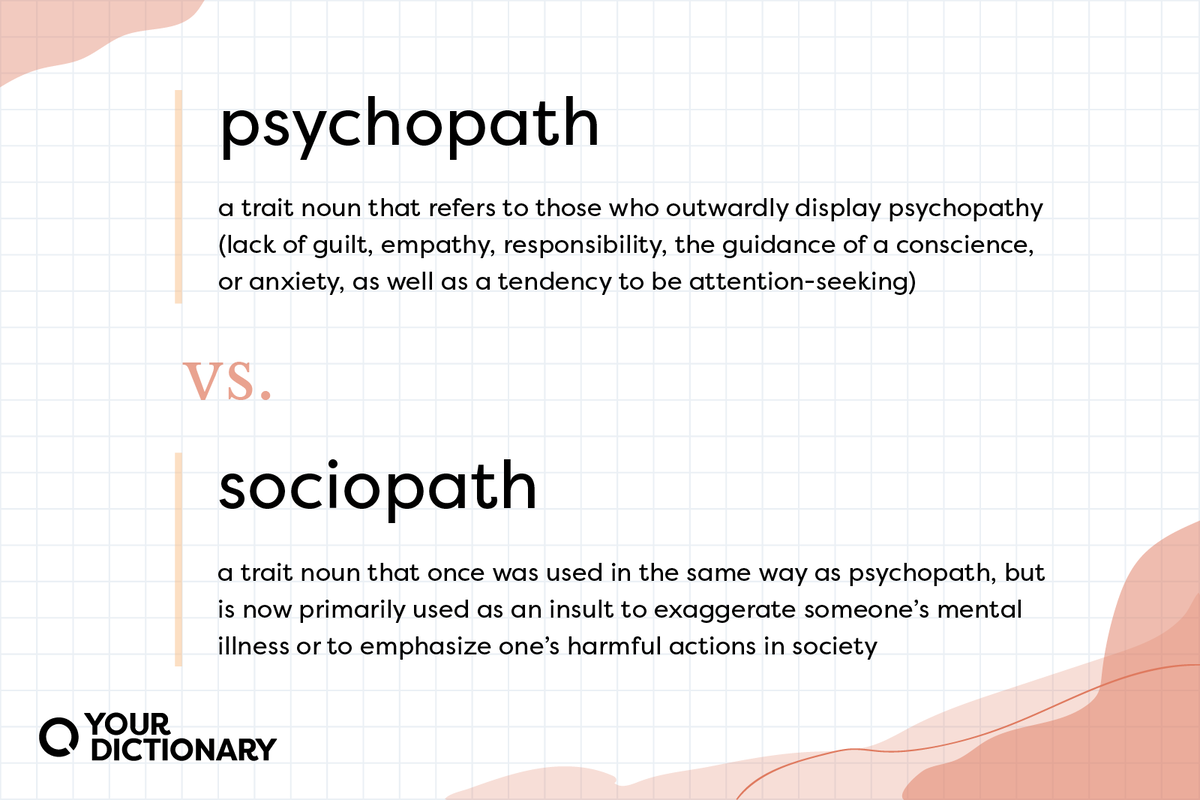
The terms psychopath and sociopath are often misused and confused. Because they relate to serious mental disorders, writers should treat these terms with care.
The most important thing to note is that neither psychopath nor sociopath is reflective of a diagnosis but is instead a way to define someone who is displaying particular characteristics.
What Does “Psychopath” Mean?
Psychopath (SIE-koh-path) is a trait noun that refers to those who outwardly display psychopathy. It describes someone as having a psychopathic personality, characterized by a lack of guilt, empathy, responsibility, the guidance of a conscience, or anxiety, as well as a tendency to be attention-seeking.
Examples of psychopath in a sentence include:
- None of the psychopath tests online are really that accurate.
- The signs of psychopathy can be very difficult to spot at a young age
- There are usually very little warning signs that someone is a psychopath.
- Some psychopaths with ASPD just need a little extra counseling and help.
Fast Fact
The term psychopath started to gain use in the late 1800s and comes from the German word psychopatisch, which combines the Greek terms psyche, meaning “soul,” and páthos, meaning “suffering,” to effectively mean “a suffering of the soul or mind.”
"Psychopath" as a Derogatory Term
Psychopath is often misused as a derogatory term for any mentally ill person. It’s used as an insult similar to crazy or madman.
This use of psychopath is highly associated with violence, abuse, or murder. Yet, a vast majority of psychopaths commit no violent crimes.
The insulting version of psychopath is sometimes shortened to just psycho, referring to someone acting out of the ordinary or violent.
Words Related to "Psychopath"
Some clinically similar words to psychopath include:
- psychopathy (noun) - the set of traits that define someone as a psychopath
- psychopathic (adjective) - describes someone as displaying these traits
- psychopathist (noun) - one who studies psychopathy (formerly, one who studies mental illness)
- psychopathology (noun) - the science of mental disorders

Basic Psychology Terms and Their Meanings
Psychopathy vs. ASPD
Antisocial Personality Disorder (ASPD) is classified by a disregard for others, a tendency to go against authority, deceitfulness, impulsiveness, aggressive behavior, disregard for the safety of others, irresponsibility, and a lack of guilt.
It’s important to note this distinction between the clinically diagnosable disorder, Antisocial Personality Disorder (ASPD) and the non-diagnosable subcategory, psychopathy. Not all psychopaths must be diagnosed with ASPD to display psychopathic tendencies.
Similarly, those suffering from ASPD are not always referred to as psychopaths, especially if they do not display symptoms related to a lack of anxiety/guilt, aggressive antisocial behavior, or callousness or are well treated.
What Does “Sociopath” Mean?
Sociopath (soh-see-oh-path) is a trait noun that once was used in the same way as psychopath, but is now primarily used as an insult to exaggerate someone’s mental illness or to emphasize one’s harmful actions in society.
Sociopaths have antisocial personality disorder (ASPD), although the term sociopath is no longer used in clinical psychology.
Since sociopath isn’t used in an official capacity anymore, here are some examples of how you can use the broader term, ASPD, in discussions of the disorder instead.
- People with ASPD might not even know that they act differently.
- Patients who describe themselves as sociopaths really mean that they have ASPD.
- Therapy and counseling are the leading methods to treat ASPD.
Sociopathy and ASPD
While referring to someone with ASPD as a sociopath would likely be understood in discussion with those familiar with clinical psychology, if used elsewhere, it’s likely to be misunderstood or taken as an insult similar to psycho.
Some scholars attempt to draw a distinction between sociopathy and ASPD, either implying that sociopaths suffer specifically from the symptoms of ASPD that impact social interaction and reaction to the authority of others.
Others make the distinction based on whether these supposed sociopathic traits were picked up from birth or from environmental effects. However, no consistent definition or classification of sociopath is used in scientific study or clinical psychology.
Fast Fact
Sociopath was coined by American psychologist George E. Partridge in the 1930s as a term combining socio- meaning “society” with -path, meaning “a person who suffers from a disorder.”
The term was created to mirror psychopath, but to deal with reactions to society rather than behavior.
Tips To Remember the Difference
Avoid spreading misinformation or offending anyone with mental illness. Instead, try to remember these facts around the differences between psychopath, sociopath, and ASPD in clinical contexts.
- ASPD - Antisocial personality disorder is a mental disorder characterized by a disregard for others and a tendency to behave aggressively and antisocially.
- Psychopath - Psychopaths experience particular symptoms of ASPD related to a lack of fear or anxiety and a tendency to seek attention.
- Sociopath - Sociopath is a term that is no longer used in the discussion of clinical psychology and ASPD.
Use ASPD in most cases and discuss psychopathy only when pertaining to particular instances of ASPD. Avoid using sociopathy in almost all cases.

Misinformation vs. Disinformation: A Simple Comparison